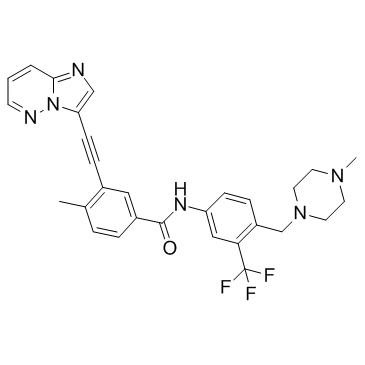
Ponatinib
CAS No. 943319-70-8
Ponatinib( AP 24534 | AP24534 | AP-24534 )
Catalog No. M16756 CAS No. 943319-70-8
Ponatinib (AP 24534) is a potent, orally active pan-inhibitor of BCR-ABL kinase with IC50 of 0.37 and 2.0 nM for ABL and mutant ABLT315I, respectively.
Purity : >98% (HPLC)
 COA
COA
 Datasheet
Datasheet
 HNMR
HNMR
 HPLC
HPLC
 MSDS
MSDS
 Handing Instructions
Handing Instructions
| Size | Price / USD | Stock | Quantity |
| 10MG | 45 | In Stock |


|
| 50MG | 58 | In Stock |


|
| 100MG | 90 | In Stock |


|
| 200MG | 127 | In Stock |


|
| 500MG | Get Quote | In Stock |


|
| 1G | Get Quote | In Stock |


|
Biological Information
-
Product NamePonatinib
-
NoteResearch use only, not for human use.
-
Brief DescriptionPonatinib (AP 24534) is a potent, orally active pan-inhibitor of BCR-ABL kinase with IC50 of 0.37 and 2.0 nM for ABL and mutant ABLT315I, respectively.
-
DescriptionPonatinib (AP 24534) is a potent, orally active pan-inhibitor of BCR-ABL kinase with IC50 of 0.37 and 2.0 nM for ABL and mutant ABLT315I, respectively; retains high potency against other ABL mutants Q252H, Y253F, M351T and H396P (IC50s<0.5 nM), also inhibits c-Src, Lyn, c-KIT, VEGFR2, FGFR1, PDGFRα (IC50s=0.2-5 nM); inhibits the growth of cells expressing native or mutant BCR-ABL (IC50s=0.5–36 nM) suppresses BCR-ABL(T315I)-driven tumor growth in mice, and completely abrogated resistance in cell-based mutagenesis screens. Blood Cancer Approved(In Vitro):Ponatinib (AP24534) potently inhibits native ABL (IC50: 0.37 nM), ABLT315I (IC50: 2.0 nM), and other clinically important ABL kinase domain mutants (IC50: 0.30-0.44 nM). Ponatinib also inhibits SRC (IC50: 5.4 nM) and members of the VEGFR, FGFR, and PDGFR families of receptor tyrosine kinases. Ponatinib potently inhibits proliferation of Ba/F3 cells expressing native BCR-ABL (IC50: 0.5 nM). All BCR-ABL mutants tested remained sensitive to Ponatinib (IC50: 0.5-36 nM) including BCR-ABLT315I (IC50: 11 nM).Ponatinib inhibits the in vitro kinase activity of FLT3, KIT, FGFR1, and PDGFRα with IC50 values of 13, 13, 2, and 1 nM, respectively. Ponatinib inhibits phosphorylation of all 4 RTKs in a dose-dependent manner, with IC50 values between 0.3 to 20 nM. Consistent with these activated receptors being important in driving leukemogenesis Ponatinib also potently inhibits the viability of all 4 cell lines with IC50 values of 0.5 to 17 nM. In contrast, the IC50 for inhibition of RS4;11 cells which express native (unmutated) FLT3, is more than 100 nM. (In Vivo):In a survival model in which mice are instead injected with Ba/F3 BCR-ABLT315I cells, administration of Dasatinib at doses as high as 300 mg/kg has no effect on survival time. By contrast, treatment with Ponatinib (AP24534) prolongs survival in a dose-dependent manner. Ponatinib dosed orally for 19 days at 5, 15, and 25 mg/kg prolongs median survival to 19.5, 26, and 30 days, respectively compare to 16 days for vehicle-treated mice (p<0.01 for all three dose levels). The anti-tumor activity of Ponatinib (AP24534) is further assessed in a xenograft model in which Ba/F3 BCR-ABLT315I cells are injected subcutaneously into mice. Tumor growth is inhibited by Ponatinib in a dose-dependent manner compare to vehicle-treated mice, with significant suppression of tumor growth upon daily oral dosing at 10 and 30 mg/kg (%T/C = 68% and 20%, respectively; p<0.01 for both dose levels). Daily oral dosing of 50 mg/kg Ponatinib causes significant tumor regression (%T/C = 0.9%, p<0.01), with a 96% reduction in mean tumor volume at the final measurement compared to the start of treatment. Ponatinib is well tolerated at all efficacious dose levels for the duration of the study; maximal decreases in body weight are <5%, <5%, and <12% for the 10, 30, and 50 mg/kg dose groups, respectively, with no signs of overt toxicity.Ponatinib (1-25 mg/kg) is administered orally, once daily for 28 days, to mice bearing MV4-11 xenografts. Ponatinib potently inhibits tumor growth in a dose-dependent manner. Administration of 1 mg/kg, the lowest dose tested, leads to significant inhibition of tumor growth (TGI=46%, P<0.01) and doses of 2.5 mg/kg or greater results in tumor regression.
-
In Vitro——
-
In Vivo——
-
SynonymsAP 24534 | AP24534 | AP-24534
-
PathwayAngiogenesis
-
TargetBcr-Abl
-
RecptorAbl|c-Kit|c-Src|FGFR1|PDGFRα|VEGFR2|LYN
-
Research AreaCancer
-
IndicationBlood cancer
Chemical Information
-
CAS Number943319-70-8
-
Formula Weight532.5595
-
Molecular FormulaC29H27F3N6O
-
Purity>98% (HPLC)
-
SolubilityDMSO: ≥ 50 mg/mL
-
SMILESCN1CCN(CC2=C(C=C(NC(=O)C3=CC(C#CC4=CN=C5C=CC=NN45)=C(C)C=C3)C=C2)C(F)(F)F)CC1
-
Chemical NameBenzamide, 3-(2-imidazo[1,2-b]pyridazin-3-ylethynyl)-4-methyl-N-[4-[(4-methyl-1-piperazinyl)methyl]-3-(trifluoromethyl)phenyl]-
Shipping & Storage Information
-
Storage(-20℃)
-
ShippingWith Ice Pack
-
Stability≥ 2 years
Reference
1. Gozgit JM, et al. Mol Cancer Ther. 2011 Jun;10(6):1028-35.
2. Huang WS, et al. J Med Chem. 2010 Jun 24;53(12):4701-19.
3. O'Hare T, et al. Cancer Cell. 2009 Nov 6;16(5):401-12.
4. Gozgit JM, et al. Mol Cancer Ther. 2012 Mar;11(3):690-9.
molnova catalog



related products
-
Nilotinib monohydroc...
A potent, selective, orally available inhibitor of both native and mutant Bcr-Abl with IC50 of 20-80 nM.
-
GMB-475
GMB-475 is a BCR-ABL1 tyrosine kinase degrader based on PROTAC, overcoming BCR-ABL1-dependent drug resistance.
-
Imatinib impurities3
Imatinib impurities3 is a protein kinases inhibitor with IC50 values of 6.95uM, 0.245uM, 0.139uM for ABL1 wt, KIT wt, PDGFRR wt, respectively.



 Cart
Cart
 sales@molnova.com
sales@molnova.com


